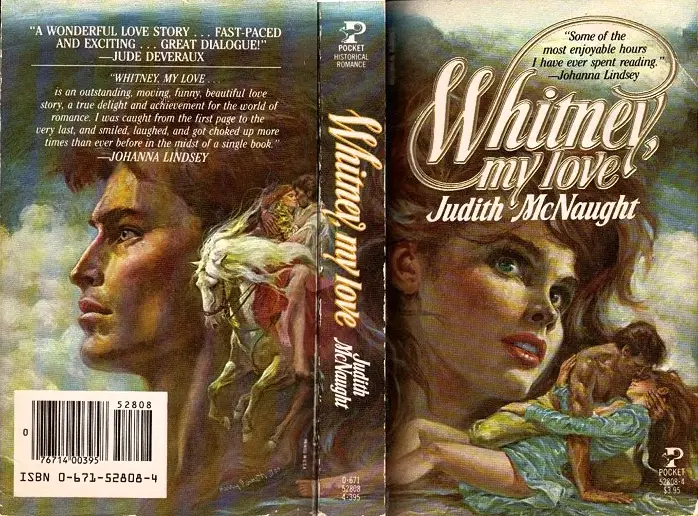…publishers began concentrating more on quantity than quality… Inevitably, the market became saturated, and – equally inevitably – disenchanted readers began expressing dissatisfaction with the quality of the books.
Judith McNaught, Q&A with All About Romance, September 1990
The promise of another Judith McNaught novel and my belief in romance died in the same breath. Here’s how it happened:
About eight months ago Judith McNaught, mother of the historical romance, founder of my relationship dreams, announced her first book release in twelve years. The Sweetest Thing, a novel that apparently changed titles and plots a dozen times was, at last, formally announced with a release date of October 23rd, 2018.
It’s May 2019 and there is no book in sight. Not only is there no book, there is no announcement of a book. No apology or explanation to disappointed fans and, bizarrely, no confirmed release. A book that has been written and the legendary author who wrote it seem to have both disappeared.
After a patient and utterly polite six-month interval, I decided to investigate this phenomenon with all the vigor born of my adolescent reading habits. I reached out to McNaught’s publisher Simon & Schuster, to journalists who had interviewed McNaught shortly before the “release”, I even rooted names from her novels’ acknowledgements and contacted anyone I could find. I did everything short of drive to her hometown in Texas and yell her name out the car window. My efforts were answered with a few occasions of blunt refusal and a lot of cryptic silence.
Why would any publisher fail to bring this romance author, one of the first to ever receive a multi-million dollar contract, back into the light?
Simon & Schuster’s lack of concern for Judith McNaught’s audience, combined with my fruitless attempts to find words of news or praise about her, is, in a word, infuriating. While a perfectly understandable reason for the quiet may exist, no one is willing to tell. It’s as if McNaught’s return would rekindle a plague fire. As if her brand of romance, so different from current top sellers, is anathema to the romance industry.
Why would any publisher fail to bring this romance author, one of the first to ever receive a multi-million dollar contract, back into the light? Why hasThe Sweetest Thing been abandoned to the black hole of Amazon pre-order, with a release date of – get this – December 2045?
Ladies and gentlemen, I have a theory. It all comes down to the difference between Judith McNaught and, to put it bluntly, everyone else.
McNaught is the mother of all romance. Whitney, My Love , published in 1985 quite literally established the popular genre of historical romance. Prior to Whitney, the 19th century was considered a big snooze and a feminist’s nightmare. Now 84% of the romance novels read are from that same “historical” sub-genre. If this decades old success were all she accomplished the vanishing act would be understood. But McNaught did so much more. She wrote a number of successful historical and modern romances, many of which appeared on the New York Times Bestseller List, dabbled brilliantly in suspense and crime driven plots, and even wrote a novel in support of adult literacy.

The works of McNaught were never mere bodice-rippers. They were unique then and are even more unique now. Several things separate her from the competition, including the sophistication and intelligence of the writing, but the biggest difference between her and, say, most of the romances at Barnes & Noble can be summed up in one old-fashioned word: sentiment.
“Reading or writing a romance novel constitutes a public declaration of sentimentality…women possess an inexhaustible abundance of determination and courage. Sentimentality has enabled us to civilize and soften the other half of the population of the planet.”
Judith McNaught, Q&A with All About Romance, September 1990
In this case, I don’t define sentiment as lovey-dovey, gushy-mushy stuff. That you can find (literally) anywhere on the romance shelf. The kind of sentiment Judith and I are talking about is transformational, and it can be applied to any and all of her heroes. McNaught men begin as alphas, arrogant and a bit domineering. By the end they’re still strong, but they’ve surrendered themselves entirely to the women they fell in love with. This is very emotionally evident to readers and is the proven McNaught guarantee.
Take, for example, A Kingdom of Dreams, published in 1989 and McNaught’s only medieval novel. The novel concludes with the hero taking his wife, and mother of his child, out onto the parapet of the keep and literally lifting her in the air, he lifts her higher and higher in triumph and adoration. The common folk below cheer wildly, and this is her “kingdom of dreams.”
The same principle applies to the modern romances. Take Someone to Watch Over Me, a mystery/suspense romance published in 2003. An utterly fantastic read. The originator of my pen name, Valente, and I say that with no shame. This novel’s hero is targeted by corrupt police and government officials, accused unjustly of every crime from manslaughter to driving five miles over the speed limit. And yet the heroine, an actress, marries and stands by him, making a point to change her surname to his on a Broadway marquee. This gruff man of mystery is melted into a puddle of sentimentality as he sees the name unashamedly light up the sky — “an unfamiliar constriction tightens his throat” and he embraces her in front of every camera and body on the street.

That is some powerful sentiment. As McNaught herself once said, it takes bravery to read and write this stuff. Bravery implies vulnerability and that is the last thing modern audiences want. Let’s take a look at recent releases, shall we?
I logged onto the website for Avon Books, #1 romance publisher, and studied the authors of their advertised releases. I went to the bookstore and read several synopses, I even peeked at their endings. Comparing these men to McNaught’s is like holding “Baby Shark” up to Beethoven. Both endearing in their own way, but one is clearly superior.
In discussion with the founder of McNaughtized, now the only place on the internet where one can find McNaught news, I asked what separates McNaught’s novels from all the rest. “She writes the most swoon-worthy heroes EVER,” Jessica said, “It really does bear repeating: BEST. HEROES. EVER!! Other authors try to create this…but then you get into said hero‘s viewpoint and the allusion shatters—either because he has the emotional range of a 19 year old frat boy, or because the author simply doesn’t seem to know how rich, commanding men think. NO ONE writes a hero the way JM does.
Comparing these men to McNaught’s is like holding “Baby Shark” up to Beethoven. Both endearing in their own way, but one is clearly superior.
Most of the released advertised by Avon include heroes of questionable magnitude: a self-made man desperate to improve his status, a second son, a scientist, or, most commonly, a man who doesn’t even want to have a title but (poor thing!) is forced to have power. In the scant few years in which I neglected the romance novel world, the industry developed an allergy to powerful men. Without powerful men, there is no opportunity for sentimental transformation. So Judith McNaught’s moving endings are replaced with sexy couples that barely resemble Georgians sneaking away to show each other the “parts they like”, a heroine expressing “very bad thoughts about a certain duke,” and finding “the passion she’d only written about.” Because that’s the sum of female happiness, (she writes sarcastically).
Even the less sexual endings struck me as unsatisfactory. In their effort to showcase womanly independence, the women are invulnerable, the men remain the same. They kiss and say something sweet and that’s the happily ever after. It’s the pithy conclusion at which critics scoff. It’s proof that romance novels are now, officially, what their detractors claim: unrealistic, uninspiring, — hollow.
Many readers expressed their dissatisfaction by refusing to buy new authors at all, or else only in used bookstores… I can only suggest that you make your preferences known in the time-honored tradition of a capitalistic society: Complain to the retailers who aren’t providing you with the products you want…
Judith McNaught, Q&A with All About Romance, September 1990
Well, Judith, here I am — complaining!
I’m doing just what you advised. Your publisher, Simon & Schuster, is not focused enough on romance to bear mentioning their latest publications. Their newest books are not yours, nor do Avon’s books hold a candle to your meaningful plot weaving and character development. We may never know what happened to The Sweetest Thing, but from what I know of current romances I can imagine what went down. Simon, and perhaps Schuster, didn’t bother to mention whatever delayed your book release because, as I can see them remarking, “No one’s interested in her books anymore. They don’t empower women.”
But I and several others are very interested. More than interested. Here’s just a few posts I found on McNaught’s Facebook page.

“‘This title will be auto-delivered to your Kindle on December 31, 2045.’ Something is terribly wrong. Yes, I and many of you have been waiting so patiently and with enthusiasm for the next book written by Ms. McNaught. What is the issue? Would like an honest and straightforward answer.”
…how can women possibly feel empowered when publishing companies carelessly decide what’s important and what isn’t, what readers want and don’t want?
“My dear favorite author … how come when I go to buy the book on Amazon they only promise to deliver when I’m 91 years old, that is December 31st, 2045?????? I found this offensive to your fans.”
“Judith McNaught – I hope you are alright. Could you please come out of hiding and tell your loyal, extremely patient fans where the book THE SWEETEST THING is and when it will truly be published or not. Your cover photo says it was supposed to come out last October 23. Then, it was scheduled to come out January 8, 2019. Still another no show. Now, I see it listed coming out in 2045. How do you expect to keep your loyal, extremely patient fans to continue coming back when you are continually lying to them?”
How indeed? And how can women possibly feel empowered when publishing companies carelessly decide what’s important and what isn’t, what readers want and don’t want? I used to feel empowered, back when I had hopes of another Matt Farrell or Michael Valente, when McNaught proudly announced her first release in twelve years and I excitedly marked my calendar. As long as her books remained prominent, I believed that a strong man could fall in love, the kind of love that lifts women up in the air and applauds their ability to, as Judith put it, “soften the other half of the population.”
Supposedly, that’s not what readers want.
My belief in romance died the day I assumed this book was never coming. It vanished with Judith McNaught. Rest assured, I won’t be picking up another romance novel any time soon. That is, unless Simon & Schuster finally deigns to speak up.
* Update *
Click here to add your name to an online petition, requesting information from Judith McNaught’s publisher Simon and Schuster.







